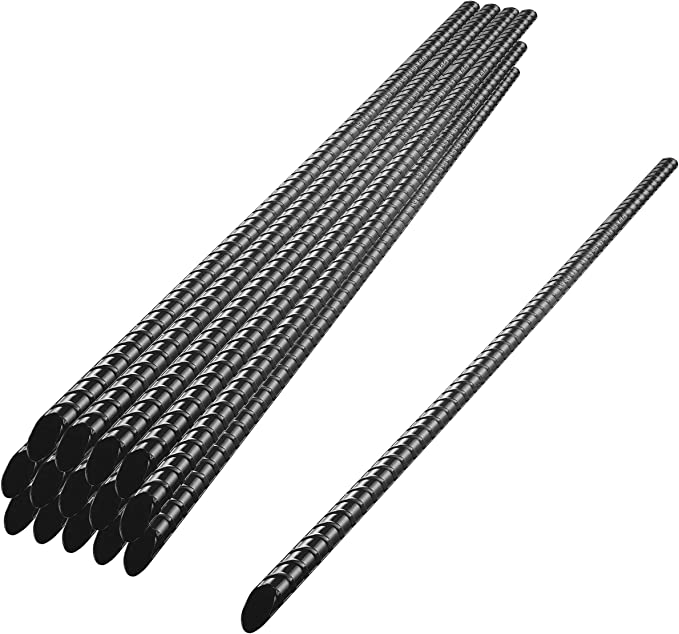
Rebar Guaranteed Best Construction Material Philippines’ Prices
Rebar, short for reinforcing bar, is a steel bar used as a tension device in reinforced concrete and reinforced masonry constructions to help and strengthen the concrete under tension.
It is also known as reinforcing steel or reinforcement steel when it is massed.
Concrete has a good compressive strength but a poor tensile strength.
Rebar greatly boosts the structure’s tensile strength. A continuous series of ribs, lugs, or indentations are present on the surface of rebar to improve concrete bonding and lessen the possibility of slippage.
Hot-rolled round bars with embossed deformation patterns are normally made of carbon steel, which is the most commonly used rebar material.
A concrete structural part reinforced with steel will experience little differential stress when the temperature changes because steel and concrete have comparable coefficients of thermal expansion.
Use of Rebars in Masonry
Concrete is a substance that is somewhat weak in tension but highly strong in compression.
Rebar is cast into concrete to carry the tensile loads in order to correct for this imbalance in the concrete’s behavior.
Primary reinforcement and secondary reinforcement make up the majority of steel reinforcement steel used to ensure the structure as a whole has the resistance required to support the design loads is referred to as primary reinforcement.
Secondary reinforcement, also referred to as thermal or distribution by providing sufficient localized resistance to prevent cracking and withstand stresses brought on by factors like temperature fluctuations and shrinkage, reinforcing is utilized for durability and aesthetic purposes.
Physical Characteristics of Rebar
The thermal expansion coefficient of steel is very similar to that of contemporary concrete.
Rebar has ribs that mechanically bind it to the concrete, but under high stresses, it can still be pulled out of the concrete, a situation that frequently occurs along with a larger-scale collapse of the structure.
If this weren’t the case, it would cause problems through additional longitudinal and perpendicular stresses at temperatures different from the temperature of the setting.

Rebar is either bent and hooked at the ends to lock it around the concrete and other rebar, or it is thoroughly sunk into adjacent structural components (40–60 times the diameter) to prevent this kind of failure.
The first method makes use of the high compressive strength of the bar to increase the friction locking it into place.
The table below shows the latest retail March 2024 prices of Rebar in Philippine Peso price per pieces including its size dimension.
Price and Standard Sizes of Main Reinforcement Bars (Rebar) per pc in the Philippines
| DESCRIPTION | SPECIFICATION | SIZE | LENGTH | PRICE |
|---|---|---|---|---|
| Rebar | GRADE 60 | 50mm Diameter | 12 meters | 4650.00 |
| Rebar | GRADE 60 | 50mm Diameter | 9 meters | 3540.00 |
| Rebar | GRADE 60 | 50mm Diameter | 7.5 meters | 3450.00 |
| Rebar | GRADE 60 | 50mm Diameter | 6 meters | 2850.00 |
| Rebar | GRADE 60 | 40mm Diameter | 12 meters | 3700.00 |
| Rebar | GRADE 60 | 40mm Diameter | 9 meters | 3744.00 |
| Rebar | GRADE 60 | 40mm Diameter | 7.5 meters | 2580.00 |
| Rebar | GRADE 60 | 40mm Diameter | 6 meters | 1600.00 |
| Rebar | GRADE 60 | 36mm Diameter | 12 meters | 3000.00 |
| Rebar | GRADE 60 | 36mm Diameter | 9 meters | 2350.00 |
| Rebar | GRADE 60 | 36mm Diameter | 7.5 meters | 1850.00 |
| Rebar | GRADE 60 | 36mm Diameter | 6 meters | 1400.00 |
| Rebar | GRADE 60 | 32mm Diameter | 12 meters | 2500.00 |
| Rebar | GRADE 60 | 32mm Diameter | 9 meters | 1800.00 |
| Rebar | GRADE 60 | 32mm Diameter | 7.5 meters | 1500.00 |
| Rebar | GRADE 60 | 32mm Diameter | 6 meters | 1300.00 |
| Rebar | GRADE 60 | 28mm Diameter | 12 meters | 1800.00 |
| Rebar | GRADE 60 | 28mm Diameter | 9 meters | 1600.00 |
| Rebar | GRADE 60 | 28mm Diameter | 7.5 meters | 1350.00 |
| Rebar | GRADE 60 | 28mm Diameter | 6 meters | 990.00 |
| Rebar | GRADE 60 | 25mm Diameter | 12 meters | 1700.00 |
| Rebar | GRADE 60 | 25mm Diameter | 9 meters | 1290.00 |
| Rebar | GRADE 60 | 25mm Diameter | 7.5 meters | 1100.00 |
| Rebar | GRADE 60 | 25mm Diameter | 6 meters | 860.00 |
| Rebar | GRADE 60 | 20mm Diameter | 12 meters | 1180.00 |
| Rebar | GRADE 60 | 20mm Diameter | 9 meters | 906.00 |
| Rebar | GRADE 60 | 20mm Diameter | 7.5 meters | 715.00 |
| Rebar | GRADE 60 | 20mm Diameter | 6 meters | 570.00 |
| Rebar | GRADE 60 | 16mm Diameter | 9 meters | 600.00 |
| Rebar | GRADE 60 | 16mm Diameter | 7.5 meters | 400.00 |
| Rebar | GRADE 60 | 16mm Diameter | 6 meters | 330.00 |
| Rebar | GRADE 40 | 12mm Diameter | 9 meters | 300.00 |
| Rebar | GRADE 40 | 12mm Diameter | 7.5 meters | 290.00 |
| Rebar | GRADE 40 | 12mm Diameter | 6 meters | 210.00 |
| Rebar | GRADE 40 | 10mm Diameter | 6 meters | 188.00 |
| TIE WIRE | No. #16 | 25kgs/roll | 2000.00 |
UPDATED: Construction Material Prices for Rebar in the Philippines (February 2024)
UPDATED: All Construction Prices are based on retail prices around hardware in Metro Manila
To see other material construction, please see here.
To know other construction guides, tips, and methodology for beginners, veterans, and contractors, please see here.
